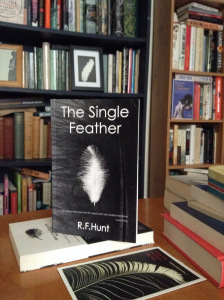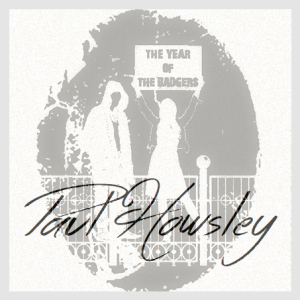Ruth F. Hunt's Blog, page 7
October 29, 2015
Feature in the Morning Star – The New Political Authors
 Originally posted on Paul Howsley:
Originally posted on Paul Howsley:
Emerging writers are breaking through the barriers of the literati. RUTH HUNT explores…
I’m pleased to say that I, along with fellow authors Rupert Dreyfus (Spark, The Rebel’s Sketchbook) and Tara Lighten Msiska (Jobcentre: Confidential), have been featured in an article written by Ruth Hunt for the Morning Star. The article’s title, The New Political Author: How the small press and self-publishing changed everything, focuses on how self-publishing has allowed new voices and new works to be released.
You can view the article here
 Along with great words from Tara and Rupert, the article also highlights my blog https://paulhowsley.wordpress.com and how I’m trying to get even more voices heard, “All three authors recognise the growing importance of the internet for campaigning and activism, with Howsley using his blog to focus on topics such as “politics, mental health and the impact of austerity and also to give a platform to those who are fighting…
Along with great words from Tara and Rupert, the article also highlights my blog https://paulhowsley.wordpress.com and how I’m trying to get even more voices heard, “All three authors recognise the growing importance of the internet for campaigning and activism, with Howsley using his blog to focus on topics such as “politics, mental health and the impact of austerity and also to give a platform to those who are fighting…
View original 80 more words


October 28, 2015
Morning Star :: The new political author: How the small press and self-publishing changed everything
Emerging writers are breaking through the barriers of the literati. RUTH HUNT explores
Source: Morning Star :: The new political author: How the small press and self-publishing changed everything


October 27, 2015
Formby Library on Thursday 29th October at 11am
Anyone who’s ever written a book will know one of the best, most pleasurable parts of the whole process is meeting readers and prospective readers. It is such a delight, and often a valuable learning process as you discover what parts of the book people enjoyed or struggled with. You also learn how to give talks and involve people in the process, even if they’ve not read the book yet.
On Thursday, I’m at Formby Library part of Sefton Library Services, and it has recently been refurbished. Isn’t that great – money being invested into such a vital resource?! Formby was where I had one of my most successful signings at The Olde Bookshop, so I’m looking forward to it. If you live in Formby or near to it, and can come to the Library this Thursday at 11am – then you’ll be made very welcome.


October 10, 2015
Morning Star :: DWP’s claimant death cover-up
Ruth Hunt talks to NICK DILWORTH about the statistical chicanery denying work assessment victims open justice
Source: Morning Star :: DWP’s claimant death cover-up


October 4, 2015
Article for The Open University Student Magazine.
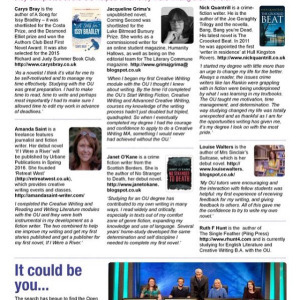
It was my pleasure recently to bring together six talented authors who had all studied modules or degrees with The Open University. They talked about how the particular courses they had undertaken had then helped them when writing their own novels. I realized I hadn’t put this on my blog so have rectified this today.
With thanks to: Carys Bray, Amanda Saint, Jacqueline Grima, Janet O’Kane, Nick Quantrill and Louise Walters.


September 28, 2015
Interview with Author and Activist, Paul Howsley
It is with great pleasure, I welcome fellow author and activist Paul Howsley to my blog to talk about his brilliant novel, The Year of the Badgers.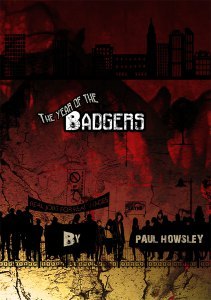
SYNOPSIS: THE YEAR OF THE BADGERS
When the government issues pre-paid benefit cards to all on welfare, it doesn’t take long before the name-calling and rationing begins. ‘Badgers’ are becoming their own class. An unmovable, unenviable and unpaid class.
The never-ending cycle of low-paid work and high=cost living has one particular badger on the edge. With WorkPlace now the only means of employment, and offering no hope for improvement, he encounters friends in the same position.
The country is abandoning the poor and stigmatizing those on welfare, but no more will they stand aside.
Voices need to be heard,people need to help, and if not them, then who?
Life isn’t going to be easy, but no battle worth fighting ever is.
THE INTERVIEW:
1) WHY DID YOU WRITE THE YEAR OF THE BADGERS?
I am from the north east of England, closer to middle age than I ever imagined I would be, and trying, as we all do, to make sense of this tiny blue dot on which we find ourselves. The Year of the Badgers is my reaction to the vilification and demeaning of the poor, by politicians, media and some parts of society, It’s set in the near-future, a way of emphasizing and sometimes exaggerating possible outcomes of where I believe our society is heading. In this world, WorkPlace (workfare, where people work for their benefit allowance) is the only employment available to the working class and their ‘benefits’ are credited via a pre-paid welfare badge, hence the term ‘badgers.’
I was looking at how our society is becoming increasingly divided and how the rhetoric that poverty is a direct result of laziness and lack of aspiration is permeating every part of of our lives; TV shows, newspapers and politicians, they all speak with the same voice and the people it affects, they have no voice whatsoever. I wrote the story to try to offer those people a voice, to show how damaging being vilified for something beyond your control can be, how destructive it is to the mind, and that what you read isn’t always reality. I also wanted to show hope, to show that no matter how bleak it becomes there is always a crack for the light to get in, and one of the cracks I try to highlights is how much compassion is out there from so many people, helping and doing all they can to turn the tide of insatiable greed and self interested politics.
2)WE BOTH WRITE ON VERY SIMILAR THEMES, PAUL. WHAT WOULD BE THE ONE THING YOU WOULD LIKE READERS TO TAKE AWAY FROM YOUR BOOK?
One thing that has fascinated me after releasing the book is how each person takes away from it something completely different. I think, the most important aspect for me is that everybody, no matter how small it may seem, can make a difference, I think we should lift people up, not put people down and I hope the book shows that too.
3) DO YOU HAVE SOME SNIPPETS FROM YOUR BOOK TO ENTICE A READER?
This is at the beginning of the book; its how Badger sees himself and how with help from WorkPlace, things are about to change:
“Here stands Badger, a feckless, lazy, uninterested waste of human matter. The universe may have been evolving, collapsing into tiny pieces, creating, destroying, recreating for billions of years but yet here he is: the most useless person that has ever been. A complete and utter waste of atoms, even dark matter cannot pass through Badger. Today though that will change. All will change with the will of The People”
This piece is an example of newspapers reporting on the poor:
“He picked up the paper and read the article; it was just one of the many awful things he had read lately that portrayed the poor in an awful light. The badge had now become the symbol of the unemployed, the sick, the disabled, and the most vulnerable. Badger had noticed the media, just like any newspaper, swirled around anybody who they deemed too lazy or too stupid to work and it seemed , people believed what they read.”
Joanna is contemplating another forced WorkPlace assignment:
“Too fucking right they could do better, that’s my whole point. My going to work for the badge will bot change that, will it?” Joanna said, “And Pride? There is absolutely no pride in being used and cast aside every twelve weeks for someone equally replaceable. Do you see pride on the faces of people on the WorkPlace? I don’t. I see worry. I see weariness, I see downcast men and women, shuffling to and from work, ridiculed at the shops when their badge has ran out, shouted down in the streets with insults like ‘badger’ and ‘scum’ for simply doing all they can to survive. Pride, I don’t see that, and you know what else I never see? Any fucking hope.”
We all need a little hope, and sometimes a voice comes out from nowhere to offer it. This politician is going against the tide, but will people listen?
“The job of the politician is to speak for all people; not just for parties with vested interests, or organizations with the biggest wallets. The first people a politician should protect are those that cannot protect themselves: those weakest and most vulnerable among us. This is, to most of us, something that seems an obvious statement of fact, and that may be so, but it’s also a forgotten fact. Now today, the opposite is true. It should shame us all. It shames me. The very fact that the most poor and the most vulnerable in society are those that are victimized and stamped upon, whereas the most wealthy and the most influential are making more profits and acquiring more assets and wealth than ever before in history, is a damning indictment of what society has become.”
4) AWAY FROM YOUR WRITING, WHAT IS OF MAJOR CONCERN TO YOU RIGHT NOW?
I have a few; corporate greed, TTIP, environment, welfare, refugees, but one that is close to my heart and not as widely reported are the policies of the current government regarding the disabled and mentally ill. So many policies, done in the name of austerity have heavily affected those people. But who am I to say so, instead read about what the DWP and the government are doing. Find out for yourself, there are many people helping right now, DPAC and WOW are two that immediately spring to mind.
5) WHAT GOOD THINGS DO YOU SEE NOW?
You know, before writing The Year of the Badgers, I focused far too much on the bad in the world, I could list some but there are far too many and that’s exactly why it can be so easy to get lost in the fog and your own apparent insignificance. After, I began to learn about so many people doing incredible work, locally, nationally, and globally. I’m not talking about charities either, I’m talking about individuals, each making their voice heard or helping those that require it most. I’ve spoken to food bank owners, shop owners who help the homeless, writers speaking out for the first time, and professionals such as lawyers and business owners fighting their own particular battle. Each time, their individual strength is awe-inspiring. Never selfish, never preaching, simply doing their bit to help others. It might be small, it might be fractured but it is hopeful and infectious and until we have a leadership willing to look out for the most vulnerable, their difference to people’s lives is incalculable.
6) ARE YOU CURRENTLY WORKING ON ANYTHING ELSE?
I’m working on a new novel right now, I don’t want to give anything away yet as it’s in the relative early stages but it’s going well. I’m also working on my blog, which focuses on many of the topics discussed in this interview; some politics, mental health and the affects of austerity and those fighting back. I started the blog in an attempt for me to learn more about the positive things in society, always asking them what positive things they see in the world right now. It’s been really interesting so far, so I hope it continues to grow.
7) ARE THERE ANY OTHER INDIE BOOKS YOU WOULD RECOMMEND?
I have read some excellent works by indie writers the latest , and possibly my favorite, is The Rebel’s Sketchbook by Rupert Dreyfus, which is a collection of short stories, all equally relevant, excellently written and utterly unforgettable, New Beat Newbie by Harry Whitewolf, is a poetry collection focused on an array of topical subjects, told expertly with wit, anger and humor, and then there was Bipolar: A breakdown by Max J. Freeman. This was a very short true account of a man’s stay in a mental institution. It was raw, frightening, and at times hilarious, which given the situation, took some skill.
8) ANY FINAL THOUGHTS?
Do not judge so harshly those that you do not know
THANKS SO MUCH PAUL AND GOOD LUCK WITH THIS BOOK AND BOOK TWO.
To find out more go to Paul’s blog at http://www.paulhowsley.worpress.com
To buy The Year of the Badgers:
http://www.amazon.co.uk/Year=Badgers-Paul-Howsley-ebook/dp/B00XII7YFK/ref=tmm_kin_swatch_0?_encoding=UTF8&qid=1443426886&sr=1-1


September 24, 2015
And so it begins! Autumn is the time to write…
I love starting a writing project in Autumn. For us here in the UK the weather is going to get more unpredictable, cold, wet, maybe snow, less chance of distraction, more time to write.
That’s all well and good, but what if you’re having trouble getting going. I was the same, before I started to write The Single Feather. Well, help is here!
Recently |I’ve been reading the rather wonderful, and extremely helpful – Writing Tools: 50 Essential Strategies for Every Writer by Roy Peter Clark. Packed with both technical and practical help, it also has exercises to help get you writing and writing well.
The section he has titled Useful Habits contains some no-nonsense tips for getting your bum on your seat and starting to work. Here I’ll list a few of the main points, with some thoughts.
1) Adopt a daily routine.
Many people stipulate a start and end time for writing each day. The reason why is to treat writing like you would a job, you clock on and you clock off. As you get used to the routine, your mind will similarly be getting used to it. It can be in the morning, evening, during the lunch hour, whenever. Just make sure it’s every day, and at the same time. As Roy Peter Clark says: ‘The key is to write rather than wait.’
2) Build in rewards
Maybe if you hit 1000 words a day you can have a treat? Or manage to work for X number of hours? Or maybe you can treat yourself after every two or three chapters, with an extra special treat for when you’ve completed your first draft? It works for lots of people.
3) Draft Sooner
Roy Peter Clark says: ‘Thorough research is a key to a writer’s success, but over-researching makes writing seem tougher. Write earlier in the process so you discover what you need.’
4)Discount Nothing
This is very important. Clark says:’Some days you’ll write many poor words. Other days you’ll write a few good words. The poor words may be the necessary path to the good words.’
5) Watch Your Language
Try not to talk about writers block, procrastination, fears or ‘this is rubbish’. Turn them into positive words or expressions. Procrastination can be a ‘rehearsal’. Fears can be ‘getting prepared’ and so on.
6) Set the Table
Clark says: ‘When work piles on my desk, I find it hard to stick to my fluent writing style. That is when I take a day to throw things away, answer messages, and prepare the altar for the next day of writing.’
7)Find a Rabbi
Clark is saying too much criticism weighs a writer down. We need it, but also we need to find people who will give us praise for our productivity and effort, and not the quality of the final work.
It helps you keep going, and gives you that boost needed to get you over the line.
8) Keep a Day-book/Journal
This is another very important point. When you are beginning to write, you will have ideas at any point during the day. I tend to get a lot of my ideas while I’m washing up. The shower is also a popular place for plot twists. Having something to write in, that’s with you all the time is so important. Make it your journal and private. So you feel safe to express ideas, test them out before rejecting them or taking them forward.
If you are starting out on a writing project, I really do recommend this book, and wish you well. I never ever thought at the start of writing The Single Feather, I’d get to a stage where I could have the second edition of the book in my hands. 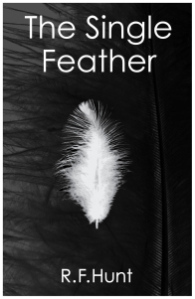
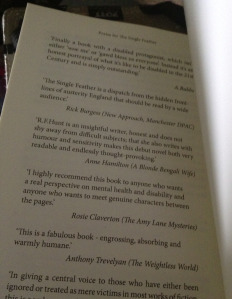
However, dreaming about that stage, and having people who believed in me helped me get my book published. Get some cheerleaders of your own, get a routine going, and a journal ready, then get writing! It really is the season to start. Good luck!
Are you starting a book or other writing project. Are you finding it easy to get going? Do you have any tips? Do use the comments section below.


September 21, 2015
Interview with author, Helen MacKinven
It is with great pleasure I welcome author, Helen MacKinven to my blog, to talk about her writing and soon to be published novel, Talk of the Toun.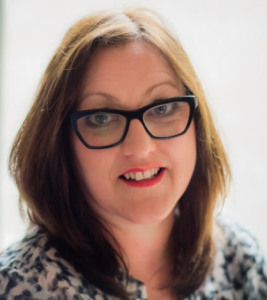
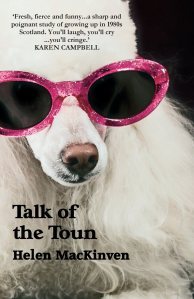
1)CAN YOU TELL THE READERS OF THE BLOG ABOUT YOURSELF AND YOUR WRITING?
For the last ten years I’ve been writing contemporary fiction and exploring the use of the Scots dialect in dialogue to create an authentic voice for working class characters. I enjoy writing flash fiction short stories and my debut novel Talk of the Toun, is the third novel I’ve written but the first to be published. In 2011, I took a career break to go to Stirling University to do an MLitt in Creative Writing but now I’m back on the road with my day job which involves traveling all over Scotland to deliver maths training for teachers, After watching one too many episodes of Escape to the Country, I moved to a three hundred year old cottage in a small rural village in South Lanarkshire to live with my husband. I have two grown-up sons but I have filled my empty nest with twelve chickens, two dogs and two pygmy goats.
2) YOUR NOVEL IS BEING RELEASED IN OCTOBER – WHAT IS IT ABOUT?
Talk of the Toun is an uplifting black comedy of love, family life and friendship and is a bittersweet coming of age tale set in the summer of 1985 in working class, central belt Scotland.
Lifelong friends Angela and Lorraine are two very different girls, with a growing divide in their aspirations and ambitions putting their friendship increasingly under strain,
Artistically gifted Angela has her sights set on art school, but lassies like Angela, from a small town council scheme, are expected to settle for a nice wee secretarial job at the local factory. Her only alley is her gallus gran, Senga the pet psychic, who firmly believes her granddaughter can be whatever she wants to be.
Though Lorraine’s ambitions are focused closer to home Angela has plans for her too, and a caravan holiday to Filey with Angela’s family tests the dynamic of their relationship and has lifelong consequences for them both,
Effortlessly capturing the religious and social intricacies of 1980’s Scotland, Talk of the Toun is the perfect mix of pathos and humor as the two girls wrestle with the complications of growing up and exploring who they really are.
3) WHAT WAS THE INITIAL IDEA FOR THE NOVEL?
One of my assignments for the Mlitt was to write a 4000 word A to Z on any topic with an average of 153 words for each letter. I chose to write about the first 18 years of my life and felt this assignment conveyed a strong sense of my writing voice. After this course, I wanted to use some of what it is like to grow up in the 1980’s in central Scotland.
4)HOW LONG DID IT TAKE TO WRITE?
It took about nine months for the first very rough draft and a further seven months of editing to get it ready for submission. For this novel I tried the ‘freefall’ writing which is defined as ‘a method some writers discover spontaneously, but many have to (re)learn: the technique of writing from the larger Self beyond the reach of the ego and its censors’ and is likened to writing without a parachute.
This was a very different style from my usual method of revising as I go along as I used to get so caught up in fine tuning every sentence the momentum of the storytelling died.
This time I stopped beating myself up and decided to write without worrying about getting it right on every level and write freely without the fear of failing.
5) WAS IT A SMOOTH PROCESS?
No! The editing took longer than I thought it would and although I was fairly happy with the overall structure of the first draft I wasn’t certain the ending worked. I was torn between tying it all up, or an ambiguous conclusion and I battled over which type of ending would be most satisfying for a reader. Thankfully, my two beta readers, independent of each other, both gave me similar feedback about the ending and even ways to make it more effective. This gave me the reassurance and confidence to make the necessary changes.
6) WHAT WOULD YOU LIKE READERS TO TAKE AWAY FROM YOUR NOVEL?
Apart from an entertaining read, I’d like readers to reflect in how their religious and social background is part of their identity but it doesn’t define them and dictate their choices for the future.
7) IF YOU HAD ONE PIECE OF ADVICE YOU COULD PASS ONTO A NEW WRITER, WHAT WOULD IT BE?
Don’t write to please others write for yourself and create the book you would want to read.
8)CAN PEOPLE PRE-ORDER YOUR NOVEL NOW? WHO IS IT PUBLISHED BY AND WHERE WILL THEY BE ABLE TO BUY IT?
Yes, and it’s published on 29th October but can be pre-ordered from Amazon.


September 8, 2015
Author of The Single Feather R.F. Hunt talks disability, stigma and ‘the cuts’.
August 29, 2015
Interview with Crime Author – Jane Isaac
It is with great pleasure I welcome Jane Isaac to the blog. Just as she gets comfy in the chair, I can tell you that she will be talking about her new book, Before It’s Too Late.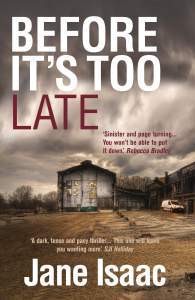
Hi Jane, Can you tell me about your novel?
Before It’s Too Late opens with the kidnapping of a Chinese student in Stratford upon Avon. As a reader we know that she has been abducted and follow her story throughout the book as she contemplates her fate while she’s held in a disused pit in the Warwick countryside.
Detective Inspector Jackman is tasked to investigate her disappearance and we also follow the police investigation through his eyes as he fights his own demons and clashes with his superiors in his quest to find her. When another student disappears he is pulled into a race against time.
What was the initial idea?
I was playing with the idea of a kidnapping for this novel and thought it would be interesting to follow story thorough the eyes of the victim. I had to do a lot of ‘real crime’ research and read accounts of hostages in order to create the situation. One of the most useful (although harrowing) books was I Choose to Live by Sabine Dardenne. When I started looking at locations, Warwickshire seemed like the perfect choice. The countryside around Stratford provides the perfect juxtaposition to a crime like kidnapping.
When did you start to write it?
I started writing Before It’s Too Late in the summer of 2013. There were a lot of field trips to Stratford, research into Chinese culture, not to mention the usual police procedural background, so it took around eighteen months to complete the project.
Describe a typical writing day?
I’m not sure I have a typical writing day! I still have a day job and a family to look after, plus a very naughty nut lovable Labrador to walk. I’m one of those writers who squeezes their writing into gaps in their daily schedule: I can often be found tapping away at my keyboard beside the pool when my daughter has a swim class, or trudging across the fields with my dog turning plot ideas in my head. Every now and then I find the odd day when I can sit in my jammies and spend the whole day at the keyboard, which is pure luxury!
Do you have events planned to promote the novel? If so, what are they?
I do love how writing a book exposes you to opportunities you’d never done before. I have done a number of signings at bookstores over the summer to promote the novel, and have been lucky enough to have been invited to a couple of local book clubs too. Later in the year, I’m off to Stratford upon Avon library, the local Rotary Club and even popping into a prison to talk to the inmates.
I really enjoyed Before It’s too Late, where can other readers find the novel?
The Amazon link for Before It’s Too Late is:
http://www.amazon.co.uk/Before-Its-Too-Late-Jane-Isaac-ebook/dp/B00QQC9VVK/ref=tmm_kin_swatch_0?_encoding=UTF8&qid=&sr=
Web: http://www.janeisaac.co.uk
Twitter: @JaneIsaacAuthor
Facebook: Jane Isaac Author



